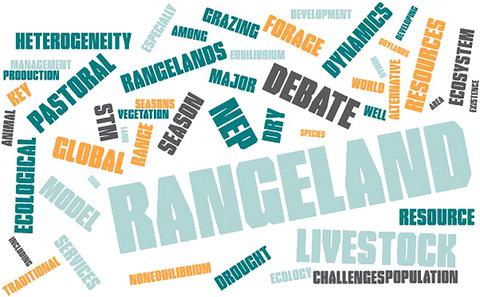当前位置:
X-MOL 学术
›
J. Appl. Ecol.
›
论文详情
Our official English website, www.x-mol.net, welcomes your
feedback! (Note: you will need to create a separate account there.)
Strategies for global rangeland stewardship: Assessment through the lens of the equilibrium–non‐equilibrium debate
Journal of Applied Ecology ( IF 5.0 ) Pub Date : 2020-04-11 , DOI: 10.1111/1365-2664.13610 David D. Briske 1 , D. Layne Coppock 2 , Andrew W. Illius 3 , Samuel D. Fuhlendorf 4
中文翻译:

全球牧场管理策略:通过均衡-非均衡辩论的视角进行评估
更新日期:2020-04-11
Journal of Applied Ecology ( IF 5.0 ) Pub Date : 2020-04-11 , DOI: 10.1111/1365-2664.13610 David D. Briske 1 , D. Layne Coppock 2 , Andrew W. Illius 3 , Samuel D. Fuhlendorf 4
Affiliation

|
- This Review assesses the adequacy of current stewardship strategies to address the accelerating challenges confronting global rangeland systems. The assessment was conducted through the lens of the rangeland ecology debate that was initiated in the late 1980s to determine whether equilibrial or non‐equilibrial models more accurately represented the ecological dynamics of rangeland systems.
- The following lessons have emerged from this prolonged debate: (a) equilibrial and non‐equilibrial dynamics among plants and herbivores always coexist in individual systems; (b) herbivore persistence is strongly influenced by functional resource heterogeneity; (c) biotic feedbacks are highly dependent upon spatial and temporal scale; (d) multiple stable states separated by nonlinear trajectories may coexist on individual ecological sites and (e) management and policy decisions can have important consequences for rangeland systems despite high environmental stochasticity.
- These lessons demonstrate that scale and functional heterogeneity were critical ‘blind spots’ within the traditional rangeland profession. In contrast, pastoral strategies recognized these system variables as essential for exploitation of heterogeneous resource distribution, rather than assuming stable, uniform resource distribution. These divergent perceptions of scale and heterogeneity in grazed ecosystems largely explain the disparate interpretations of ecological carrying capacity that was central to the debate.
- Programmes supporting supplemental feeding and infrastructure development have created an anthropogenic category of non‐equilibrial dynamics by sustaining large numbers of livestock during droughts. These programmes decouple livestock and rangeland resources to create an additional stewardship dilemma regarding complex trade‐offs between livestock production and the capacity of systems to provision a broad array of global ecosystem services.
- Synthesis and applications. The fundamental challenge facing the global rangeland community may not be identification of a unified model of rangeland ecology—as assumed during the rangeland debate. Rather, the challenge may be how to best transform rangeland social–ecological systems to provide optimal combinations of ecosystem services to meet the needs of global citizens, while improving the well‐being of millions of rangeland residents who are highly dependent upon provisioning services. A comprehensive accounting of rangeland ecosystem services, supported by institutional governance and delivered as state–community partnerships, may provide the foundation for an alternative stewardship strategy to pursue this critical goal.
中文翻译:

全球牧场管理策略:通过均衡-非均衡辩论的视角进行评估
- 这篇评论评估了当前管理策略是否足以应对全球牧场系统面临的日益严峻的挑战。该评估是通过1980年代后期开始的草地生态学辩论的镜头进行的,以确定平衡模型或非平衡模型是否更准确地代表了草地系统的生态动力学。
- 这场旷日持久的辩论得出了以下教训:(a)植物和草食动物之间的平衡和非平衡动力学总是在单个系统中共存;(b)草食动物的持久性受到功能资源异质性的强烈影响;(c)生物反馈在很大程度上取决于时空尺度;(d)由非线性轨迹分隔的多个稳定状态可能共存于各个生态场所,并且(e)尽管环境随机性很高,但是管理和政策决策可能对牧场系统产生重要影响。
- 这些经验表明,规模和功能异质性是传统牧场专业中的关键“盲点”。相反,牧区策略认为这些系统变量对于开发异构资源分配至关重要,而不是假定稳定,均匀的资源分配。在放牧生态系统中,对规模和异质性的这些不同看法很大程度上解释了对生态承载力的不同解释,这是辩论的核心。
- 支持补充饲料和基础设施发展的计划通过在干旱期间维持大量牲畜创造了非平衡动力的人为因素。这些计划使牲畜和牧场资源脱钩,从而在牲畜生产与提供广泛的全球生态系统服务的系统能力之间的复杂权衡之间造成了额外的管理难题。
- 综合与应用。牧场辩论中假设的那样,全球牧场社区面临的根本挑战可能不是确定牧场生态的统一模型。相反,挑战可能是如何最佳地改变牧场社会生态系统,以提供最佳的生态系统服务组合,以满足全球公民的需求,同时改善数以百万计的高度依赖提供服务的牧场居民的福祉。对牧场生态系统服务的全面评估,在机构治理的支持下,以及作为州与社区的伙伴关系,可以为实现这一关键目标的替代管理策略奠定基础。











































 京公网安备 11010802027423号
京公网安备 11010802027423号